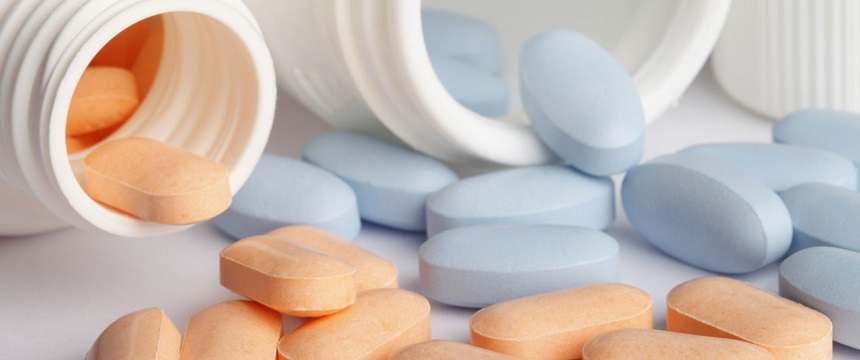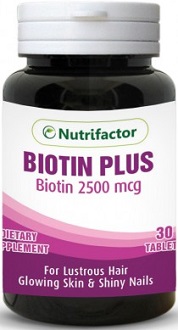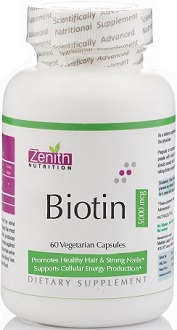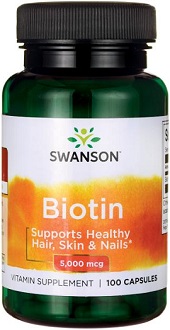What is Biotin?
Biotin, commonly known as Vitamin B7, is an essential vitamin. It provides numerous benefits that many people probably don’t think about. Getting the recommended daily intake of Biotin can sometimes be difficult, because it is found in foods that are not always consumed in large quantities such as bananas, carrots, eggs, dairy products, nuts, chicken, and liver. However, some individuals choose to take Biotin supplements in order to increase their daily intake (1).
No matter how you decide to get your daily Biotin, it’s important that you do, indeed, consume the recommended amount daily, especially since Biotin is water-soluble, meaning your body will eliminate it regularly in urine. Here are top 8 reasons that Biotin is important.
#1. Biotin Strengthens Hair and Nails
 Biotin is sometimes referred to as vitamin H, and is often included in hair products because it helps strengthen and thicken hair. It also strengthens and increases the thickness of nails. Conversely, a Biotin deficiency can lead to split ends in your hair and the thinning of nails. Sometimes it can even cause brittle hair or hair loss (2). The way Biotin strengthens hair is by improving the strength of hair follicles which provides strength to new hairs as they grow and replaces older hairs. It also increases hair elasticity which prevents it from drying out. Biotin strengthens nails by increasing keratin production, which is responsible for the development of nails (3).
Biotin is sometimes referred to as vitamin H, and is often included in hair products because it helps strengthen and thicken hair. It also strengthens and increases the thickness of nails. Conversely, a Biotin deficiency can lead to split ends in your hair and the thinning of nails. Sometimes it can even cause brittle hair or hair loss (2). The way Biotin strengthens hair is by improving the strength of hair follicles which provides strength to new hairs as they grow and replaces older hairs. It also increases hair elasticity which prevents it from drying out. Biotin strengthens nails by increasing keratin production, which is responsible for the development of nails (3).
Bottom Line: Biotin strengthens hairs and increases nail thickness, making them look healthier and stronger.
#2. Improves Skin Health
Biotin is key for producing healthy skin. It is often included in many skin cream and skin moisturizing formulas. It breaks down fatty acids which helps promote healthier and glossier skin. It has even been used to treat dandruff. Unfortunately, too much Biotin can produce undesired side effects such as acne, skin pigmentation, oily skin and allergic reactions (4). So it is best to carefully monitor how much you’re applying and your skin’s reaction.
Bottom Line: Using the correct amount of Biotin can make skin healthier and look glossier.
#3. Biotin Improves Cardiovascular Health
 Biotin can help decrease the risk of a number of heart problems. Biotin reduces inflammation and atherosclerosis, which is the narrowing and hardening of arteries, thus helping to prevent strokes and heart attacks. It also reduces plaque build up in the arteries. Some studies have linked Biotin to lower cholesterol levels, which improves overall heart health and reduces the risk of diabetes. A Biotin deficiency can lead to cardiovascular disease and insulin resistance (3).
Biotin can help decrease the risk of a number of heart problems. Biotin reduces inflammation and atherosclerosis, which is the narrowing and hardening of arteries, thus helping to prevent strokes and heart attacks. It also reduces plaque build up in the arteries. Some studies have linked Biotin to lower cholesterol levels, which improves overall heart health and reduces the risk of diabetes. A Biotin deficiency can lead to cardiovascular disease and insulin resistance (3).
Bottom Line: Receiving the recommended amount of Biotin can improve heart health and reduce the risk of heart disease.
#4. Biotin Increases Energy
Biotin is responsible for making sure a number of enzymes in the body function properly. This includes carb, fat, and protein enzymes that are necessary for keeping the metabolism on track. For example, Biotin helps enzymes start gluconeogenesis, which allows amino acids and other sources, rather than carbs, to encourage glucose production. Biotin is also responsible for fatty acid synthesis and the breakdown of amino acids. Essentially this means that Biotin helps turn carbs, fat, and proteins into energy the body can use (5).
Bottom Line: Biotin is essential for a working metabolism, which is responsible for your energy levels.
#5. Biotin May Be Linked To Healthier Pregnancies
 Biotin deficiency during pregnancy could have a negative effect on the fetus. Biotin deficiencies in pregnant women may even lead to birth defects. The research in this area is ongoing, but preliminary studies have shown that biotin deficiencies can cause birth defects such as cleft palate, cleft lip, and other deformities, in animals. So far deficiencies in mice and chickens have been discovered. Of course, this does not mean Biotin deficiencies necessarily cause decencies in humans. However, it’s still a good idea to try and receive the recommended amount of Biotin (6).
Biotin deficiency during pregnancy could have a negative effect on the fetus. Biotin deficiencies in pregnant women may even lead to birth defects. The research in this area is ongoing, but preliminary studies have shown that biotin deficiencies can cause birth defects such as cleft palate, cleft lip, and other deformities, in animals. So far deficiencies in mice and chickens have been discovered. Of course, this does not mean Biotin deficiencies necessarily cause decencies in humans. However, it’s still a good idea to try and receive the recommended amount of Biotin (6).
Bottom Line: Biotin could be responsible for certain birth defects in animals and, possibly, birth defects in humans.
#6. Biotin Lowers Blood Sugar
Biotin can have a positive effect on a diabetic’s blood sugar levels. The research regarding Biotin and type 1 and 2 diabetes is still inconclusive, but some studies suggest that diabetics suffering from a Biotin deficiency, have higher blood sugar levels. Studies have shown that the combination of Biotin and chromium can help lower blood sugar levels in diabetics who do not respond as well to medication. It can also help improve cholesterol, depression, and feelings of fatigue in diabetics (7).
Bottom Line: Biotin could help improve a number of health concerns for diabetics. Specifically, it can help lower blood sugar levels, in diabetics whose medication doesn’t seem to help.
#7. Biotin Helps Cognitive Function
Another one of the many health benefits Biotin provides is improving cognitive function. Biotin can also help keep the nervous system in shape by improving nerve signals that travel between the brain and the rest of the body. Biotin also improves overall brain function. It can improve memory, concentration, and mood. It can help prevent diseases such as dementia and Alzheimer’s. Biotin has even been known to help prevent neurodegenerative disorders (5).
Bottom Line: Biotin is essential for proper brain function. It improves cognitive function and helps improve mood.
#8. Biotin Aids With Weight Loss
 As already briefly mentioned, Biotin can help individuals lose weight by giving metabolism a boost. While Biotin itself does not burn fat, or cause weight loss, it helps the body speed up the fat burning process. It does this by activating an enzyme called acetyl-coA carbozylase.
As already briefly mentioned, Biotin can help individuals lose weight by giving metabolism a boost. While Biotin itself does not burn fat, or cause weight loss, it helps the body speed up the fat burning process. It does this by activating an enzyme called acetyl-coA carbozylase.
This enzyme helps stop the body from storing fat, and instead turns it into energy (8).
Bottom Line: Biotin can help increase the rate of weight loss by boosting the metabolism.
Conclusion
Biotin has numerous health benefits. This list only contains eight of what we believe are the most important benefits of this compound, but there are many more. While Biotin deficiencies are rare in Western countries, we hope this list encourages you to become more aware of your daily Biotin intake.
References
- http://www.livescience.com/51696-biotin-vitamin-b7.html
- http://www.womansday.com/style/beauty/a2339/what-to-eat-for-healthy-hair-nails-116095/
- https://www.diamondherbs.co/top-7-biotin-benefits-for-thicker-hair-skin-and-nails/
- http://durablehealth.net/biotin/biotin-for-skin-benefits-reviews-results/
- https://www.zenwiselabs.com/blogs/news/76605253-12-impressive-benefits-of-biotin
- http://www.livestrong.com/article/476781-can-you-take-biotin-while-pregnant/
- http://www.webmd.com/diabetes/news/20011015/can-mix-of-chromium-biotin-help-diabetics-control-blood-sugar#1
- http://www.livestrong.com/article/324249-effects-of-biotin-on-the-weight-loss/





